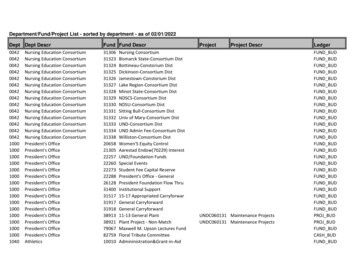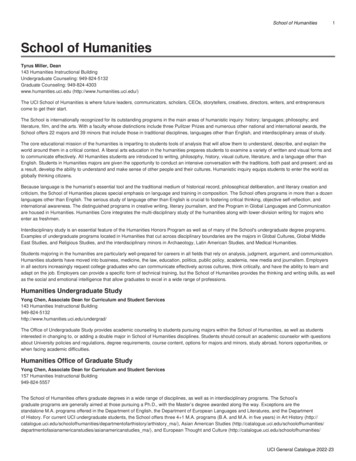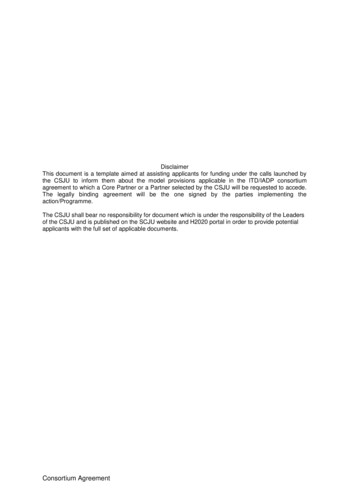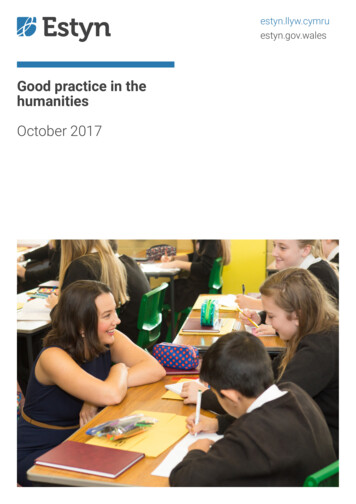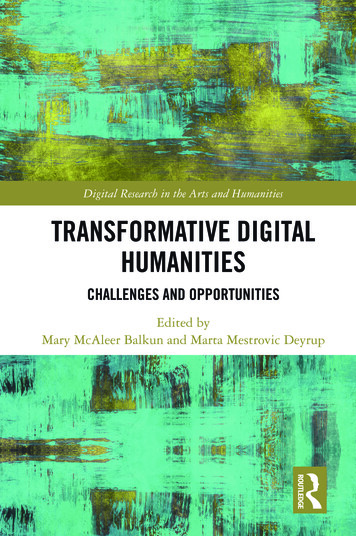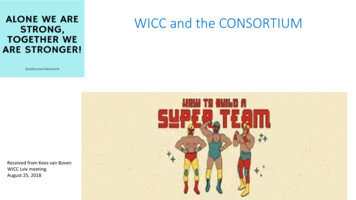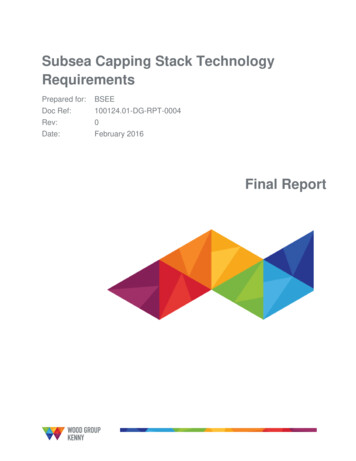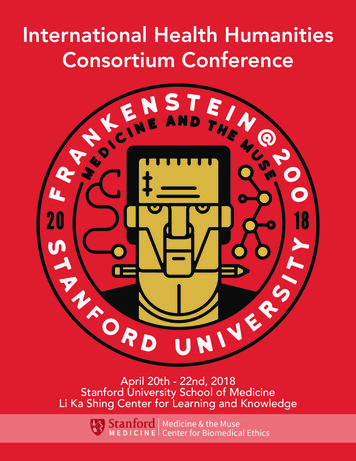
Transcription
International Health HumanitiesConsortium ConferenceApril 20th - 22nd, 2018Stanford University School of MedicineLi Ka Shing Center for Learning and KnowledgeMedicine & the MuseCenter for Biomedical EthicsPage 1
Partner and SponsorsPartnerElyce Melmon, in honor of Ken MelmonSponsorsAnesthesiology, Perioperative& Pain MedicineThe Marmor Foundation / Drs. Michael and Jane MarmorMedicine and the Muse is deeply grateful for the generosity of our partner and sponsors.Page 2
ContentsPartner and Sponsors2Meeting at a glance4Map6Shuttle schedule7Conference committee& Health humanities leadership9Plenary speakers10Plenary panel12Breakout sessions/leaders13Performers20Plenary moderators and hosts21Evening film events/leaders22Concurrent sessions schedulesSaturdaySunday2325Page 3
Meeting at a glanceFriday, April 207:30am - 8:30amRegistration & breakfast8:30am - 8:45amWelcome, Audrey ShaferLi Ka Shing Center (LKSC) 2nd Floor LobbyLKSC Berg HallPlenary moderator, Jacqueline GenoveseLKSC Berg Hall8:45am - 9:45am9:45am - 10:15am10:15am - 11:45amPlenary, Alexander NemerovLKSC Berg HallBreakPlenary panel, Holly Tabor (moderator)LKSC Berg Hall12:00pm - 1:00pmLunch12:30pm - 1:00pmSpecial performance: Frankenstein: A reading, Anthony Heald1:15pm - 2:15pm2:30pm - 3:30pmLKSC 2nd Floor LobbyLKSC Berg HallFirst breakout sessionSecond breakout session3:30pm - 3:45pmBreak3:45pm - 4:00pmWelcome back, Audrey ShaferLKSC Berg HallPlenary moderator, David ElkinLKSC Berg Hall4:00pm - 5:00pmPlenary, Lester D. Friedman5:00pm - 6:00pmReception8:00pmLKSC Berg HallLKSC 2nd Floor LobbyFilm: Bride of FrankensteinThe Stanford Theatre, Palo Alto (schedule available online)Breakout sessions1:15pm - 2:15pm breakout session2:30pm - 3:30pm breakout sessionThe spark of life in modern medicine:Who’s the monster?, David GabaThe spark of life in modern medicine:Who’s the monster?, David GabaHippocrates Cafe: Frankenstein@200, Jon HallbergHippocrates Cafe: Frankenstein@200, Jon HallbergWriting & Storytelling Workshop, Laurel BraitmanImagine that: A workshop exploringcreating writing in the health humanities,Lise Saffran and Lois LeveenRoom LK062, Simulation Center, Capacity: 15LKSC Berg HallRoom LK205/206, Capacity: 15Creature Lab: How to sculpt a face, Eliza ReisfeldRoom LK208, Capacity: 15; 1:15pm - 3:30pmAnderson Art Tour, Betty NoguchiAnderson Collection, Capacity: 10Room LK062, Simulation Center, Capacity: 15LKSC Berg HallRoom LK203/204, Capacity: 20Frankenstein on film: A screeningof video essays, Shane DensonMcMurtry Building, Room 115, Capacity: 40Anderson Art Tour, Betty NoguchiAnderson Collection, Capacity: 10Cantor Arts TourCantor Arts Center, Capacity: 20Page 4
Meeting at a glanceSaturday, April 217:30am - 8:30amRegistration & breakfast8:30am - 8:45amWelcome, Audrey ShaferLKSC 2nd Floor LobbyLKSC Berg HallPlenary moderator, Laurel BraitmanLKSC Berg Hall8:45am - 9:45am9:45am - 10:00amPlenary, Alvan IkokuLKSC Berg HallBreak10:00am - 11:00amConcurrent sessions11:00am - 11:15amBreak11:15am - 12:15pmConcurrent sessions12:30pm - 1:30pmLunchLKSC 2nd Floor Lobby1:00pm - 1:30pmSpecial performance: Aleta Hayes & The Chocolate Heads Movement Band1:30pm - 1:45pmBreak1:45pm - 2:45pmConcurrent sessions2:45pm - 3:00pmBreak3:00pm - 4:00pmConcurrent sessions4:00pm - 4:15pmBreak4:15pm - 5:15pmHHC Business Meeting, Therese Jones, Craig Klugman8:00pmLKSC Berg HallLKSC Berg HallFilm: National Theatre Frankenstein, Maren Monsen, Diana FaridHerrin Hall T175Sunday, April 227:30am - 8:30am8:30am - 8:45amRegistration & breakfastLKSC 2nd Floor LobbyWelcome, Audrey ShaferLKSC Berg HallPlenary moderator, Lois LeveenLKSC Berg Hall8:45am - 9:45am9:45am - 10:00am10:00am - 11:00am11:00am - 11:15am11:15am - 12:15pm12:15pm - 12:30pm12:30pm - end12:30pm - 1:30pm1:30pm - 2:30pmPlenary, Catherine BellingLKSC Berg HallBreakConcurrent sessionsBreakConcurrent sessionsBreakLunch (boxes available)LKSC 2nd Floor LobbyConcurrent sessionsClosing Circle, Laurel BraitmanLKSC Berg HallPage 5
MapDowntownPalo AltoRDPalo AltoTransit LLAVERDVE871rINRDOUMMRETCABOELARPALMDRALRETown & CountryShopping CenterStanfordHospitalRothWayGarage4School ofMedicine2GALVEZ STPackardStadium3ASTVIA OSTHooverTower6RET A TERESAMainQuadMemAud.SDSTSANPU5 LLA htMgmt. Ctr.DSTE1Sheraton/Westin Hotels5Herrin Hall2LKSC, where conference islocated6CEMEX Auditorium (located inthe Business school)3Cantor Arts Center andAnderson Collection7Palo Alto Caltrain/TransitCenter4McMurtry Building8Stanford TheatreHOPage 6
Shuttle scheduleChartered shuttleWe will be providing a chartered shuttle that makes round trips between the SheratonPalo Alto Hotel and LKSC, where the conference will be taking place. Additionally,Saturday night, we will be providing a shuttle making round trips between the hoteland Herrin Hall, where the evening film will be shown.Please note that there is no shuttle servicing the Westin Hotel, as the Westin Hotel iswithin walking distance to the Sheraton Hotel.The shuttle makes trips at the following times:FridayApril :15pm4:45pm5:15pm5:45pm6:15pm-SaturdayApril 21AMPMSaturdayApril :30pm10:00pm10:30pm11:00pmSundayApril pm9:15pm9:45pm10:15pm10:45pmPage 7
Shuttle scheduleMarguerite shuttleStanford also provides free Marguerite shuttles, stopping at multiple places on campus.Specifically, on Friday, you can take the X shuttle from the Sheraton and Westin hotelsto the conference, and the Y shuttle from the conference to the Sheraton and Westinhotels.Note: these shuttles do not run on the weekendRRYPalo AltoTransit CenterXr1ELOINMCAALRECHELX ShuttleFrom Sheraton (near Westin) to ConferenceFriday, 5:50am - 8:30pm, every 20 tanfordHospital2School alooY ShuttleUPalo AltoTransit Center2From Conference to Sheraton (near Westin)Friday, 6:30am - 9:00pm, every 20 minutesEL1OINMCAALREYStanfordHospitalSchool ofMedicineLKSC2Stadium1RothWayGarageStanford School of Medicine: closest stop toLKSC, where conference is located; withinwalking GarageCenterROTHWAYStanfordShoppingCenterPalo Alto Caltrain/Transit Center: directlybehind the Sheraton ford School of Medicine: closest stop toLKSC, where conference is located; withinwalking distancePalo Alto Caltrain/Transit Center: directlybehind the Sheraton HotelBingConcertHallP kPage 8
Health Humanities ConsortiumConference CommitteeChair: Audrey ShaferPlanning member: David Elkin, UCSFAbstracts chair: Laurel BraitmanInitial web content: Tacy FramheinCoordinator: Monique Chao NorquistLogistics: Joshua StanleyWebmaster: Natasha GuptaFilm events: Maren Monsen, Diana FaridFrankenstein@200 logo: Ryan BrewsterVice-chair: Jacqueline GenoveseFinance director: Stephany PrinceSocial media: Julia PandolfoPrint materials: John NguyenProgram/badge design: Rebecca ShaferConference team members: ArchanaBharadwaj, Jacob Blythe, Jen Ann Ehrlich,Kelly Cox Gonzalez, Harika Kottakota, NickLove, Amrapali Maitra, Leslie Reisfeld, GabbyRivera, Anne Summers, Robert Townsend, PattiUngaro, Arany UthayakumarHealth Humanities Consortium Steering CommitteeCo-ChairsTherese Jones, University of Colorado Anschutz Medical CampusCraig Klugman, DePaul UniversityTreasurerMichael Blackie, University of Illinois at ChicagoMembersSarah Berry, Bellarmine UniversityStephanie Brown Clark, University of Rochester Medical CenterKatherine Burke, Lerner College of Medicine, Cleveland ClinicNate Carlin, University of Texas HoustonQuentin Eichbaum, Vanderbilt University Medical CenterLes Friedman, Hobart & William Smith CollegesRebecca Garden, SUNY Upstate Medical UniversityErin Lamb, Hiram CollegeBrad Lewis, New York UniversityLise Saffran, University of MissouriAudrey Shafer, Stanford University School of Medicine/VAPAHCSDanielle Spencer, Albert Einstein College of Medicine/Columbia UniversityGail Werblood, University of Illinois at ChicagoPage 9
Plenary speakersAlexander NemerovCarl & Marilynn Thoma Provostial Professor in the Arts & HumanitiesDepartment of Art & Art HistoryStanford UniversityThe Ghost of Jane McCreaPhoto credit: Bob RichmanFriday, April 20, 8:45amAlexander Nemerov writes about the presence of art, the recollection of the past, and the importanceof the humanities in our lives today. A noted writer and speaker on the arts, he recently deliveredthe 66th annual Andrew W. Mellon Lectures in the Fine Arts at the National Gallery in Washington,D.C. His most recent books are Summoning Pearl Harbor (2017), Soulmaker: The Times of Lewis Hine(2016), Silent Dialogues: Diane Arbus and Howard Nemerov (2015), and Wartime Kiss: Visions of theMoment in the 1940s (2013).Lester D. FriedmanEmeritus Professor and Former ChairMedia and Society ProgramHobart and William Smith CollegesCreature Features: The Universal andHammer Frankenstein FilmsFriday, April 20, 4:00pmProfessor Friedman also taught cinema studies at Syracuse, Northwestern, American Universities, theArt Institute of Chicago, and the Spertus Institute. He taught health humanities and bioethics at Upstate Medical Center (Syracuse) and the Feinberg School of Medicine at Northwestern University. Hisareas of expertise include: film genres, American cinema of the 1970s, American Jewish cinema, British film of the 1980s, Health and Humanities, and Multiculturalism in Film. The author, co-author, andeditor of over 20 books and numerous articles, he has written books about Steven Spielberg, ArthurPenn, Peter Pan, Frankenstein, and Clint Eastwood. His two screenplays, Prisoners of Freedom (2002)and Thomas Scasz and the Myth of Mental Illness (1989) have been the basis of independent filmsdirected by the award-winning visual artist Owen Shapiro.Page 10
Plenary speakersAlvan IkokuAssistant Professor of Comparative Literature and MedicineStanford UniversityEthics, Dialogue, and FrankensteinSaturday, April 21, 8:45amAlvan Ikoku is affiliated with Stanford’s centers for African studies, comparative studies in race andethnicity, biomedical ethics and global health. His research explores the intersection of literature andmedicine, specializing in the study of African and African diasporic literatures, twentieth-century fiction, narrative ethics, and histories of tropical medicine and global health. He has written for the WorldHealth Organization, Small Axe, Narrative Inquiry in Bioethics, and Virtual Mentor. He has receivedpresident’s teaching awards at Columbia and Harvard Universities. His research has been funded bythe Mellon Foundation, the American Council of Learned Societies, Columbia’s Institute for Social andEconomic Research and Policy, the Marjorie Hope Nicolson Fellowship, and the Rhodes Trust.Catherine BellingAssociate Professor of Medical EducationCenter for Bioethics and Medical HumanitiesNorthwestern University Feinberg School of MedicinePlaying with Fire:Sick Prometheus and the Risk of ScienceSunday, April 22, 8:45amCatherine Belling’s first book, A Condition of Doubt: The Meanings of Hypochondria (Oxford, 2012),won the 2013 Kendrick Book Prize (US Society for Literature, Science, and the Arts). She is editor ofthe journal Literature and Medicine (Johns Hopkins U Press). She has also taught at Stony Brook University Health Sciences Center School of Medicine. Her research and teaching focus on hypochondriasis, cultural narratives regarding health/disease and their role in fostering anxiety about disease andhealth care, the role of narrative in patients’, physicians’, and biomedical scientists’ thinking about theinside of the living human body, and the place of fear and uncertainty in medical epistemology.Page 11
Plenary panelFrankenstein’s Creature through a Disability Lens:Multidisciplinary Perspectives on Inclusion, Exclusion andOthernessFriday, April 20, 10:15amHolly TaborAssociate Professor of MedicineAssociate Director for Clinical Ethics and EducationStanford University School of MedicineHolly Tabor, PhD, is currently Associate Professor in the Department of Medicine at theStanford University School of Medicine and the Associate Director of the Stanford Centerfor Biomedical Ethics. She conducts research on ethical issues in genetic research, specifically issues in new genomic technologies in research and clinical care. She is also conductingstudies characterizing the perspectives of parents and adolescents across different contexts ofpediatric genetic research about ethical and social issues.Rabia BeltAssistant ProfessorStanford University School of LawRabia Belt is a legal historian whose scholarship focuses on disability and citizenship. Shereceived her JD from the University of Michigan Law School in 2009 and her PhD in AmericanStudies from the University of Michigan in 2015. Her scholarship ranges from cultural analysisof disability in media, to contemporary issues facing voters with disability, to the historicaltreatment of disabled Americans. She is currently writing a book titled Disabling Democracyin America: Disability, Citizenship, Suffrage, and the Law, 1819-1920.Rebecca GardenAssociate Professor of Bioethics and HumanitiesPublic Health and Preventative MedicineSUNY Upstate Medical University, Syracuse, NYRebecca Garden earned her PhD from Columbia University’s Department of English. She haspublished on healthcare, narrative, and disability and Deaf studies in journals including NewLiterary History, Disability Studies Quarterly, and the Journal of General Internal Medicine andis the Executive Director of the Consortium for Culture and Medicine, an inter-institutionalcollaboration.David PlatzerEthnographerAdobe SystemsDavid Platzer is a PhD candidate in the Anthropology department at Johns Hopkins, where heis in the final stages of writing his dissertation, “Autism at Work: Labor, Reason, and the Valueof Difference,” which he plans to defend in September, 2018. This ethnographic research,which took him to sites as disparate as Addis Ababa, Ethiopia, Bangalore, India, and deepinto the heart of Silicon Valley, focused on the development of employment programs targeted at autistic adults, over of 80% of whom are unemployed globally. David is also an Experience Researcher with Adobe’s Design Research and Strategy group in San Francisco.Page 12
Breakout sessions/leadersWriting & Storytelling WorkshopFriday, April 201:15pm - 2:15pmRoom LK205/206Maximum capacity: 15The medical humanities are a storytelling field but so often we miss opportunities to infuse our workwith creativity and connection. In this short session, Stanford Medicine and the Muse Writer-in-Residence Laurel Braitman will lead you through exercises to deepen and expand your approach to writing and introduce tips, tricks, and techniques that will help you make your written work more vibrant,alive, provocative and meaningful to your readers—inside the academy and beyond. Please bringsomething to write with/on.Laurel BraitmanAdjunct ProfessorAnesthesiology, Perioperative & Pain MedicineWriter in ResidenceMedicine and the Muse, Center for Biomedical EthicsStanford University School of MedicinePhoto credit: Bret Hartman(She will also lead Closing Circle, Sunday, April 22, 1:30pm)Laurel Braitman is the New York Times bestselling author of Animal Madness (Simon & Schuster 2015).Her writing has appeared in The Guardian, The New York Times, National Geographic, The Wall StreetJournal, Wired, and other publications. Her next book is about family, medicine, and how we die(forthcoming, Simon & Schuster). She holds a PhD in history, anthropology, science, technology andsociety from MIT, is a senior TED fellow and her work and collaborations with physicians, musiciansand artists has been featured on the BBC, NPR, Good Morning America, Al Jazeera and elsewhere.Page 13
Breakout sessions/leadersThe spark of life in modern medicine: Who’s the monster?Friday, April 201:15pm - 2:15pm and 2:30pm - 3:30pmRoom LK062Maximum capacity: 15 in each sessionHeld in the operating room within the simulation center, this session addresses clinical issues of putting real patients into various states of nearly “suspended animation” and then “reanimating them,”such as in various aspects of cardiac arrest or the state between living and dying with subsequent“resuscitation” [in French “reanimation”] with CPR and electric shock.The major thread of the session, triggered by Frankenstein, is about the “creation” of “creatures”or “monsters” in partial simulations of human beings, primarily for teaching of healthcare personnel(novices to experts). In healthcare simulation “we” (clinicians and staff) “create” (designers, manufacturers) and/or “use” (instructors; learners/participants) real or virtual artifacts (such as computerizedmannequins) that are meant to be imitations of humans to one degree or another. This session willexplore some of the issues raised by such creation and use, including: the reaction of participants and lay persons to our simulation “mannequins” (?”monsters”) the emotional and philosophical “meaning” we — the users — attach to these creations as we usethem to try to improve the quality and safety of healthcare choices made by mannequin designers about what “human features” are included in the device issues of the Uncanny Valley (where some kinds of partial imitations of humans are consider more orless “uncanny” (i.e. “creepy”) by some people what it means (to participants and instructors) for the simulator (creature) to “die”David M. GabaAssociate Dean for Immersive & Simulation-based LearningProfessor of Anesthesiology, Perioperative & Pain MedicineStanford School of MedicineStaff AnesthesiologistFounder & Co-DirectorPatient Simulation Center at VA Palo Alto Health Care SystemDavid Gaba’s laboratory has worked extensively on human performance and patient safety issues. Hislaboratory is a pioneer in applying organizational safety theory to health care. The laboratory is also theinventor of the modern full-body patient simulator and is responsible for adapting Crew Resource Management training from aviation to healthcare, first for anesthesia and then for many other healthcare domains. He is a key pioneer in the development of cognitive aids and Emergency Manuals in healthcare.The lead author of Crisis Management in Anesthesiology (now in its 2nd edition), he was the foundingEditor-in-Chief of the journal Simulation in Healthcare – for which he served as the EIC for 12 years.Page 14
Breakout sessions/leadersCreature Lab: How to sculpt a faceFriday, April 201:15pm - 3:30pm (one group only)Room LK208Maximum capacity: 15Ever seen an unforgettable face? Come sculpt it with us! In this workshop, you’ll learn the basics ofsculpting a face in clay. Whether it’s a human you know, or a creature you’ve dreamt up, you’ll learn thefundamental techniques of 3D art and design. Through guided instruction, you’ll create your very ownclay character portrait to take home. All materials are provided, and no artistic experience is necessary.Eliza ReisfeldIllustratorSculptorDesignerEliza Reisfeld is an illustrator and Art Director at RogueMark Studios. She graduated from RISD witha BFA in illustration, and has studied at the Animation Collaborative. Her passion for animals, nature,and the human connection inspire her work. She captures charming personalities with a variety of mediums, including paint, ink, digital media, and clay.Take a peek at her work if you’re curious, at elizareisfeldart.com.Page 15
Breakout sessions/leadersHippocrates CafeFriday, April 201:15pm - 2:15pm and 2:30pm - 3:30pmLKSC Berg Hall CNo sign up needed, same performance both timesThis session will explore “Frankenstein” through spoken word and music,drawing from the novel and source materials, as well as poetry and proseinspired by Mary Shelley’s work. Dr. Jon Hallberg, the creator of Hippocrates Cafe, will serve as the narrator. He’ll be joined by actors CandaceBarrett and Raye Birk, and musicians Robert Bell (guitar) and Dan Newton(accordion). Collectively, these Minnesota-based performers have appeared in television and film, on stages throughout the country and acrossthe globe (including Broadway and the West End in London), and on suchshows as “A Prairie Home Companion.”Jon HallbergAssociate ProfessorFamily Medicine and Community HealthUniversity of MinnesotaJohn Hallberg, an award-winning physician and educator, is the medical director of the innovative University of Minnesota Health Mill City Clinic in Minneapolis, which he helped design. Since 2003, Jonhas been the regular medical commentator on the regional “All Things Considered” on MinnesotaPublic Radio, appearing over 500 times. In 2009 Dr. Hallberg created Hippocrates Cafe, a live radio-inspired show that explores healthcare topics using professional actors and musicians. To date, he hascreated over 100 different shows that have appeared in eight states across the country.Page 16
Breakout sessions/leadersFrankenstein on film: A screening of video essaysFriday, April 202:30pm - 3:30pmMcMurtry Building, Room 115Maximum capacity: 40Stanford media scholar Shane Denson has curated a selection of video essays and related videographic works that deal with the rich cinematic history of Frankenstein films. Beginning with ThomasEdison’s single-reel Frankenstein from 1910, more than 200 adaptations, spin-offs, and rip-offs ofMary Shelley’s Gothic novel have appeared on film, television, or other moving-image media. Many ofthese, including the Universal Studios productions of the 1930s and 1940s — which gave birth to theiconic image of the monster, as embodied by Boris Karloff — include highly self-reflexive mediationson cinema itself. Cinema, it has been argued, is itself an essentially Frankensteinian technology; itassembles the dead (photographic) traces of living beings, puts them together in a new arrangementor body (via montage), and re-animates them with a spark of life (or light, in the act of projection). Thehistory of Frankenstein films thematizes this act of animation, as well as related media-technologicalinnovations: the addition of sound, color, 3D, or computer-generated imagery. The screening sessiontakes up these and other issues through a series of video essays looking at Frankensteinian films fromEdison’s early cinematic Frankenstein to the computational or post-cinematic images of Ex Machina(2014).Shane DensonAssistant ProfessorFilm & Media Studies ProgramDepartment of Art & Art HistoryStanford UniversityShane Denson’s research and teaching interests span a variety of media and historical periods, including phenomenological and media-philosophical approaches to film, digital media, comics, games,videographic criticism, and serialized popular forms. He is the author of Postnaturalism: Frankenstein, Film, and the Anthropotechnical Interface (Transcript-Verlag/Columbia University Press, 2014)and co-editor of several collections: Transnational Perspectives on Graphic Narratives (Bloomsbury,2013), Digital Seriality (special issue of Eludamos: Journal for Computer Game Culture, 2014), and theopen-access book Post-Cinema: Theorizing 21st-Century Film (REFRAME Books, 2016).See shanedenson.com for more information.Page 17
Breakout sessions/leadersImagine that: A workshop exploring creating writing in thehealth humanitiesFriday, April 202:30pm - 3:30pmRoom LK203/204Maximum capacity: 20How can imagination animate your teaching and scholarship? Which health humanities goals canbe best achieved through imaginative activities? In this workshop, participants will explore howeasy-to-incorporate creative writing exercises can bring important themes to life for scholars and students of health humanities. Health humanities teaching and research often focuses on close readingsof literary fiction and poetry as a means to increase empathy, curiosity, and tolerance for ambiguity.This workshop reveals how these effects can be deepened when we imagine someone else’s experience through creative writing exercises. Drawing on their dual experience as novelists and health humanities scholars, Lise Saffran and Lois Leveen will demonstrate how simple creative writing promptscan deepen our (and our students’) ability to connect and communicate with people regarding illness,medical care and public health.Participants will leave this workshop with a hands-on understanding of the value of creative writingwithin health humanities; with practical strategies for embedding this approach within courses, clerkships, or in Balint groups, Schwartz Rounds, and similar professional settings; and with deeper confidence in their own abilities as creative writers. No previous experience in creative writing is required.Lise SaffranDirectorMaster of Public Health ProgramUniversity of MissouriLise Saffran, MPH, MFA, teaches Storytelling in Public Health. A graduate of theIowa Writers’ Workshop in fiction and the UNC Gillings School of Global PublicHealth, her writing on health humanities has appeared in Academic Medicine, theJournal of Medical Humanities, Medical Humanities, the Journal of Applied Artsin Health, Scientific American and elsewhere. She is the author of the novel Juno’sDaughters (Penguin/Plume 2011) and numerous short stories.Lois LeveenHumanitiesForHealth.orgLois Leveen, PhD, works in health humanities with a focus on fostering greaterreflection for individuals and deeper bonds of community among practitioners,patients, and families. She is the author of the novels Juliet’s Nurse (Simon & Schuster 2014) and The Secrets of Mary Bowser; her poetry has appeared in numerousliterary journals and been engraved on a hospital wall. She has also been publishedin Ars Medica, Permanente Journal, The New York Times, The Atlantic, the ChicagoTribune, the Wall Street Journal, the Los Angeles Review of Books, the HuffingtonPost, NPR and C-SPAN.Page 18
RRYRDPalo AltoTransit CenterUNSStanfordShoppingCenterQUABreakout sessions/leadersVisiting Stanford’s art museumsELFriday, April 20AR and 2:30pm - 3:30pm; Capacity: 10 per sessionAnderson Collection: 1:15pm - 2:15pmBORETCantor Arts Center: 2:30pm - 3:30pm; Capacity:20UMAlso available to visit on your own time, no signRupD l ofMedicineAnderson Collection3Cantor Arts CenterStadiumBingConcertHallLLREASSTMemAud.SDA MAPUSERRMVIA ORROTHWAY2CAPANAMATEGA1LKSC, where conference islocatedGALVEZ STPALMDRALPackard1Town &ShoppTT A TERESAMainQuadST2 Anderson Collection314 Lomita DriveModern and Contemporary American ArtHooverTowerGSB/KnightMgmt. Ctr.33 Cantor Arts Center328 Lomita Drive at Museum WayBetray the Secret: Humanity in the Age ofFrankenstein – Ruth Levison Halperin Gallery(2nd floor)Page 19
PerformersAnthony HealdActorFrankenstein: A ReadingFriday, April 20, 12:30pm, LKSC Berg HallAnthony Heald has received two Tony Award nominations, two Obie Awards, and a Theater WorldAward. He was most recently on Broadway in The Elephant Man with Bradley Cooper. A member ofthe Oregon Shakespeare Festival Acting Company, he has appeared as Shylock in Merchant of Veniceand Tartuffe in Tartuffe. In the San Francisco Bay Area he has played the role of King Lear in the California Shakespeare Theater. Filmography includes Silence of the Lambs (Dr. Frederick Chilton) andtelevision series include Boston Public (Scott Gruber). His audiobook narration credits include StarWars books and Frankenstein.Aleta HayesLecturerContemporary Dance and PerformanceDepartment of Theater and Performance StudiesStanford UniversityChocolate Heads PerformancePhoto credit: Anne Marie SconbergSaturday, April 21, 1:00pm, LKSC Berg HallAleta Hayes is a dancer, choreographer, performer and educator. Her MFA in Dance and Choreography is from New York University Tisch School of the Arts. Prior to Stanford, Hayes taught at Wesleyan,Swarthmore, Rutgers and Princeton. As a dancer, she has performed in works by Robert Wilson andJane Comfort, and her choreography has been seen in New York City and London. The winner of multiple fellowships and artist residencies, Hayes founded The Chocolate Heads Movement Band in 2009.Her work has been hailed for its innovation, interdisciplinarity, focus on diversity, and collaborativespirit.Page 20
Plenary moderators and hostsAudrey ShaferProfessor, Anesthesiology, Perioperative & Pain MedicineVeterans Affairs Palo Alto Health Care SystemDirector, Medicine and the Muse, Center for Biomedical EthicsStanford University School of MedicineWelcomeFriday, April 20 - Sunday, April 22, 8:30amAudrey Shafer is the founder of the Medicine & the Muse Program, co-director of the BiomedicalEthics and Medical Humanities Scholarly Concentration; and co-founder of Pegasus Physician Writers.She is the author of The Mailbox, a children’s novel on posttraumatic stress disorder in veterans. Herpoetry on anesthesia, health humanities and family life has been published in journals and anthologies.Jacqueline GenoveseAssistant DirectorMedicine and the Muse, Center for Biomedical EthicsStanford University School of MedicinePlenary ModeratorFriday, April 20, 8:40amJacqueline Genovese teaches writing and literature for Stanford students who are veterans or military-related, and leads
Stanford also provides free Marguerite shuttles, stopping at multiple places on campus. Specifically, on Friday, you can take the X shuttle from the Sheraton and Westin hotels to the conference, and the Y shuttle from the conference to the Sheraton and Westin hotels. r EL CAMINO REAL G A A QU AR Y RD T Y A O A Y WE C H RD Arrillaga Cantor Arts .
